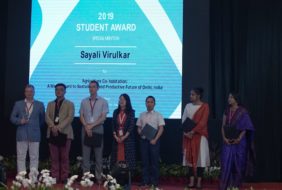 The Student Award (SA) addresses a bachelor and/or master student or student-group with outstanding results in a related field to urban and regional planning. As a form of ISOCARP’s recognition of the efforts by future planning professionals, the award is bestowed for final design projects, theses, studio projects, etc.
The Student Award (SA) addresses a bachelor and/or master student or student-group with outstanding results in a related field to urban and regional planning. As a form of ISOCARP’s recognition of the efforts by future planning professionals, the award is bestowed for final design projects, theses, studio projects, etc.
In 2019, a record number of fourteen SA entries covering various aspects related to the broad field of spatial and urban planning were submitted:
- Factors leading to disposal of toxic and hazardous sacred waste and its effect on urban river contamination: case of Adi Ganga, Kolkata, India, by Srijita Chakrabarty
- Humanizing the marginalized: urban regeneration for informal/marginal communities in a mixed-use, religious neighborhood of a metropolis: demonstration site of Kalighat, Kolkata, India, by Pritam Dey
- Urban rehab: a spatial strategy to reduce violent crime in Watts, by Bas Dijkhoff
- Socio-ecological systems of urban lakes, Bangalore: case of Jakkur Lake precinct Bangalore, by Manasa Garikaparthi
- Designing an Urban-ecological Interface: A case of East Kolkata Wetlands, Kolkata, by Upama Gosh
- Urban Halo, by Shuo Guo
- Urbanisation et developpement durable: proposition d’une strategie d’amenagement et de developpement durbale pour la commune d’arrondissement de Yaounde VII-Cameroun, by Leandry Jieutsa
- The invisible citizens – Addressing the homeless migrants: case of North Delhi, by Meenakshi M. Nair
- Economic revitalisation of cultural region: a case study of Telangana state, by Manthapuri Sadhana
- Responsive Microclimates of Public Spaces in Planned Cities : The in-betweens of a Metropolis, by Deepshikha Sinha
- Vavaland: awakening a sleeping beauty, by Ania Sosin
- Analysis of the Implementation of Disaster Risk Management in Peru: Focus on Risk Governance, by Sally Torres
- Design for increasing employability: urban environment for experiential learning, by Penugonda Varshini
- Agriculture co-habitation: A Way Forward To Sustainable And Productive Future of Delhi, India, by Sayali Virulkar
The jury composed of two young planners, an experienced ISOCARP member, a Board member and a Scientific Committee member, i.e. Christina Rasmussen (Norway) and Divya Chopra (India) as YPPs, Mahak Agrawal (India), Malgorzata Hanzl (Poland), Board member, and Nasim Iranmanesh (Iran), the SC member, elected the following entries as the winners:
SA Winner:
Meenakshi NAIR, The invisible citizens – Addressing the homeless migrants: case of North Delhi.
Tackling the issue of homeless and migrant communities in New Delhi, the project reminds that dignity and ethics are essential for the urban planning profession in the constant search for a better and harmonious cohabitation in this world. The topic is highly relevant for contemporary planning faced with the immense challenges of urbanisation and global migrations. On the one hand, the author demonstrates very high sensibility, while, on the other, in-depth reflection and understanding of local people’s needs gained through the study firmly justifies the proposed solutions. While the formal city building framework continues to imagine world-class cities, this project attempts to reveal the human, socio-spatial, and economic reality of ‘invisible citizens’ in our cities.
SA Winner:
Sally TORRES, Analysis of the Implementation of Disaster Risk Management in Peru: Focus on Risk Governance.
Although addressing the issue of disaster risk management – a highly topical one due the growing urbanisation, demographical challenges and climate change – the main project value is in its methodological approach: multi-level and in-depth analysis of governance framework, planning system, decision-making process, as well as the instruments and tools to tackle disaster risk management in Peru. Claiming the importance of urban planning, the project proposes the range of consistent strategic actions to be handled by the relevant actors and institutions. Both systemic and clear project approach has a strong potential to extend beyond academic debate and be implemented in planning practice.
SA Special mention:
Sayali VIRULKAR, Agriculture co-habitation: A Way Forward To Sustainable And Productive Future of Delhi, India.
Moving beyond a dichotomous understanding of urban and rural, the project tries to explore the interface between the urban and the rural through a systemic framework of linkages. It places an emphasis on the idea of agricultural cohabitation that tends to make our cities both productive and sustainable.
SA Special mention:
Manasa GARIKAPARTHI, Socio-ecological systems of urban lakes, Bangalore: case of Jakkur Lake precinct Bangalore.
By understanding the urban lakes as social-ecological systems, the project goes beyond the usually narrow relationship between natural and built environment. More precisely, the project reflects upon the morphological development of the area, its heritage and building traditions, its natural conditions, as well as social needs and the economic situation, thus integrating environmental sustainability in a broader narrative of urban development.
We express our gratitude to all the applicants and look forward to numerous SA submissions in a year to come.